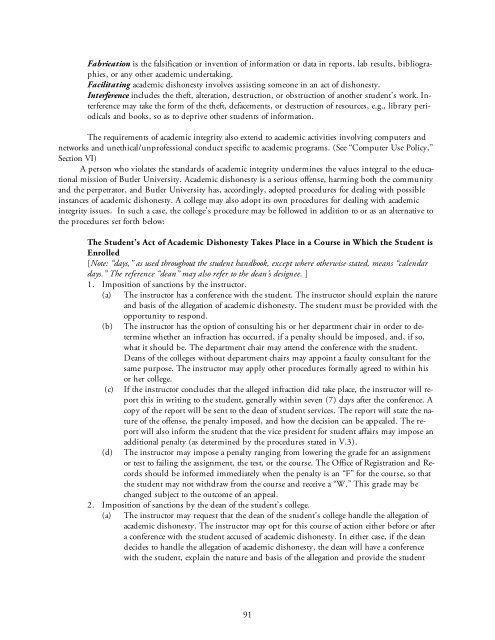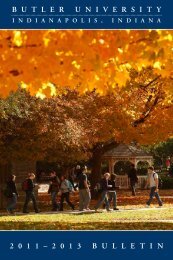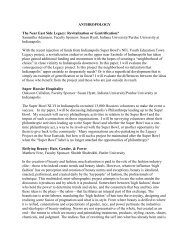Student Handbook - Butler University
Student Handbook - Butler University
Student Handbook - Butler University
You also want an ePaper? Increase the reach of your titles
YUMPU automatically turns print PDFs into web optimized ePapers that Google loves.
Fabrication is the falsification or invention of information or data in reports, lab results, bibliographies,<br />
or any other academic undertaking.<br />
Facilitating academic dishonesty involves assisting someone in an act of dishonesty.<br />
Interference includes the theft, alteration, destruction, or obstruction of another student’s work. Interference<br />
may take the form of the theft, defacements, or destruction of resources, e.g., library periodicals<br />
and books, so as to deprive other students of information.<br />
The requirements of academic integrity also extend to academic activities involving computers and<br />
networks and unethical/unprofessional conduct specific to academic programs. (See “Computer Use Policy,”<br />
Section VI)<br />
A person who violates the standards of academic integrity undermines the values integral to the educational<br />
mission of <strong>Butler</strong> <strong>University</strong>. Academic dishonesty is a serious offense, harming both the community<br />
and the perpetrator, and <strong>Butler</strong> <strong>University</strong> has, accordingly, adopted procedures for dealing with possible<br />
instances of academic dishonesty. A college may also adopt its own procedures for dealing with academic<br />
integrity issues. In such a case, the college's procedure may be followed in addition to or as an alternative to<br />
the procedures set forth below:<br />
The <strong>Student</strong>’s Act of Academic Dishonesty Takes Place in a Course in Which the <strong>Student</strong> is<br />
Enrolled<br />
[Note: “days,” as used throughout the student handbook, except where otherwise stated, means “calendar<br />
days.” The reference “dean” may also refer to the dean’s designee. ]<br />
1. Imposition of sanctions by the instructor.<br />
(a) The instructor has a conference with the student. The instructor should explain the nature<br />
and basis of the allegation of academic dishonesty. The student must be provided with the<br />
opportunity to respond.<br />
(b) The instructor has the option of consulting his or her department chair in order to determine<br />
whether an infraction has occurred, if a penalty should be imposed, and, if so,<br />
what it should be. The department chair may attend the conference with the student.<br />
Deans of the colleges without department chairs may appoint a faculty consultant for the<br />
same purpose. The instructor may apply other procedures formally agreed to within his<br />
or her college.<br />
(c) If the instructor concludes that the alleged infraction did take place, the instructor will report<br />
this in writing to the student, generally within seven (7) days after the conference. A<br />
copy of the report will be sent to the dean of student services. The report will state the nature<br />
of the offense, the penalty imposed, and how the decision can be appealed. The report<br />
will also inform the student that the vice president for student affairs may impose an<br />
additional penalty (as determined by the procedures stated in V.3).<br />
(d) The instructor may impose a penalty ranging from lowering the grade for an assignment<br />
or test to failing the assignment, the test, or the course. The Office of Registration and Records<br />
should be informed immediately when the penalty is an “F” for the course, so that<br />
the student may not withdraw from the course and receive a “W.” This grade may be<br />
changed subject to the outcome of an appeal.<br />
2. Imposition of sanctions by the dean of the student’s college.<br />
(a) The instructor may request that the dean of the student’s college handle the allegation of<br />
academic dishonesty. The instructor may opt for this course of action either before or after<br />
a conference with the student accused of academic dishonesty. In either case, if the dean<br />
decides to handle the allegation of academic dishonesty, the dean will have a conference<br />
with the student, explain the nature and basis of the allegation and provide the student<br />
91
















